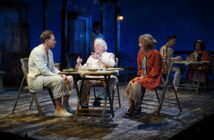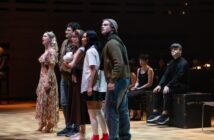An Advance Profile of Ricky Ian Gordon’s 27, an opera about Gertrude Stein, with libretto by Royce Vavrek, to be presented at New York’s City Center, October 20 and 21, 2016.
“Knock, knock” was no joke at chez Gertrude Stein in early 20th-century Paris. Rather, a knock at the private side entrance of one cramped room in Stein’s small apartment at 27 rue de Fleurus cued the commencement of serious and exciting business on any given Saturday evening. That was when the likes of Matisse and Picasso, F. Scott Fitzgerald, Hemingway, Man Ray, and other artists, writers, and avant-garde headliners of the day convened to confab, critique each other, engage in controversy, and hopefully curry favor with the veritable Mother Superior of Modernism, Gertrude Stein herself.
It was all strictly by invitation – a sort of scrappy aesthetes’ speakeasy – and Stein would signal whose work was up and whose was down by where it was hung in the room, or whether its author was called upon to share. These were designer cockfights of the highest order, and Stein gleefully mediated, refereed, even egged things on, as hostess, mentor, patroness, foil, and friend.
It’s a world evoked with exquisitely playful seriousness in 27, the new opera about Stein and her charmed artistic circle by prodigiously versatile composer Ricky Ian Gordon, with libretto by protean operatic wordsmith Royce Vavrek, and starring celebrated, powerhouse mezzo-soprano Stephanie Blythe as Stein.
The work had been commissioned by, and premiered to great acclaim at, Opera Theatre of Saint Louis in 2014. But the upcoming incarnation represents not only a New York premiere – it is also a world premiere of the opera as now reimagined and expanded by the composer and his original creative team to honor the 75th anniversary of that legendary New York institution formerly known as the “Collegiate Chorale” and now dubbed MasterVoices.
Salon Treatment
It’s not farfetched to think of Gertrude Stein’s salon as the engine room of Modernism, with Stein as chief engineer, channeling the energy of fomented rivalries, pushing emotional buttons and pulling levers of temperament as she kick-started a new artistic age into high gear.
Gordon’s and Vavrek’s opera captures precisely that idea. But it also tells other stories, working on multiple levels with concision, wit and velocity, moving fluidly over a broad expanse of time.
Not only do we witness Stein’s marquee-name coterie of acolytes ebb and flow; there’s also the story of Stein’s combustive relationship with her equally brilliant, fractious brother, Leo; and there are the still controversial subjects of Stein’s stratagems for living openly as a lesbian, and for surviving as a conspicuous Jew in pro-Nazi Vichy France.
Then there’s the inextricably intertwined story of Stein’s life partner, Alice B. Toklas. Indeed, Stein’s singular relationship with Toklas lies at the true heart of the opera.
27 is, above all else, a love story.
All for Love

Stephanie Blythe as Gertrude Stein in Opera Theatre of Saint Louis’ 2014 production of “27.” Photo by Ken Howard.
Lest anyone think that Stein was sui generis – a one-woman dream factory coaxing forth the latent genius of an era – the opera is bent on reminding us of the contributions of the self-effacing, ever-capable Alice B. Toklas, indispensable to Stein in every respect – practically, emotionally, artistically, existentially.
“The reason that Gertrude’s and Alice’s relationship worked,” says mezzo-soprano Stephanie Blythe, “was that Alice completely sublimated herself. She buried everything of herself for Gertrude. She became a function of Gertrude.”
“It was an extraordinary relationship,” agrees librettist Vavrek of Stein and Toklas. “They were married, for all intents and purposes. And they demanded homonormativity in Paris in the early 20th Century.”
And talk about division of labor: “I love the idea that they had these off schedules,” says Vavrek. “Gertrude wrote all night, and Alice typed it all up during the day. Yin and Yang. They truly did complement each other.”
Moreover, as Blythe notes, “Gertrude hosted the salons. But Alice worked them.” Alice took coats, arranged seating, saw to refreshments, enforced Stein’s agenda. And, in her own cagey way, she also staved off encroachments and ran interference with interlopers and adversaries, ranging from brother Leo to Alice’s own perceived emotional rival, Pablo Picasso (whom Alice seems to have viewed as something of a vandal at the gates).
“They don’t exist without one another,” says Blythe. “In that respect they are the prototypical marriage. I don’t think Gertrude would ever have been able to do what she did with her life had it not been for Alice.”
Indeed, Stein’s most commercially successful literary work – the book which largely permitted her and Alice to continue living in comfort (not to mention conduct those Saturday salons) – was The Autobiography of Alice B. Toklas (not a biography, note, but Stein’s nervy creation of someone else’s autobiography!). Essentially, Stein appropriated Alice, assumed her voice, literarily swallowed her whole, all with Alice’s acquiescence. Moreover, Stein did it in large part to make Alice an organ vouching for Gertrude’s own genius!
Wittily, Vavrek opens his libretto with a prologue entitled “Alice Knits the World.” Alice, at her needles, purls into a flashback evoking those heady salon days of yore (Toklas did survive Stein by more than 20 years). The opera thus sidles into the world of Gertrude Stein via Alice, with a wry obliquity that probably would have delighted Stein herself.
The role of Alice, originated in the Saint Louis production by the marvelous Elizabeth Futral, will be played at City Center by world-class soprano Heidi Stober.
Music of the Peers
Composer Ricky Ian Gordon has been a staple of the American cabaret, musical theater, art song and opera scene for decades. His monumental operatic adaptation of The Grapes of Wrath garnered near universal adulation, and its score, with a masterly panoptic approach to all things musical Americana, is outstanding.
For 27, Gordon has done something equally remarkable. The sprightly, piquant and smart interplay of themes instantly evokes the time and tone of Stein’s Paris, and does it by brilliant and intentional musicological design.
“I wanted it to sound like I was one of Les Six,” Gordon says, referring to critic Henri Collet’s 1920 coinage for the six groundbreaking “Montparnasse” composers then crafting the most cutting-edge sounds in serious French music (Poulenc being the most famous of them today).
“I was the seventh of Les Six!” Gordon playfully avers.
It’s a great strategy, and it works beautifully, but Gordon’s resourcefulness doesn’t stop there. From a launching pad of delicious Montparnasse pastiche, Gordon’s score evolves over the course of the opera to capture a breathtaking arc of emotional maturation, embrace of change and loss, and ultimate affirmation of life.
“I wanted it to be playful and energetic and then go deep,” Gordon says of his score’s architecture. To achieve that, he looked beyond the modernist French clique, drawing inspiration as well from Benjamin Britten’s virtuosic comic opera, Albert Herring, and, for the opera’s later emotional profundity, no less a font than Verdi’s magical valedictory masterpiece, Falstaff.
Becoming Stein
Gordon’s success in crafting a score for a Stein opera might almost be considered kismet. The very idea of the opera was Gordon’s own, and stems from a deeply personal and longstanding affinity for the subject and her lifestyle.
“I was 17, at Carnegie Mellon University,” recalls Gordon. “I got a terrible cold. All I could do was eat tangerines and lie in bed. One of my roommates had this book called The Charmed Circle [by James R. Mellow, subtitled Gertrude Stein and Company]. I lay in bed and read it. And all I could think was, ‘how can I become Gertrude Stein?’” For Gordon, it was a call to the life he was meant to live, and he answered.
While still an undergraduate, Gordon began buying artwork from the university’s fine arts department. When he eventually moved to New York, he established a salon series of his own, in an apartment he shared with two roommates. “We had this apartment filled with paintings and drawings, and every time I wrote something new, like a new song cycle, I would invite people over to hear it.”
Gordon still gleefully participates whenever he can in salon-style events sponsored by others, such as fundraisers for arts organizations. He plays piano, sings, and can recite eclectic yards of his favorite poetry – including Stein’s – from memory.
“I give good salon,” Gordon says waggishly.

(Back L to R) Daniel Brevik, Tobias Greenhalgh, and Theo Lebow as paintings with (center) Stephanie Blythe as Gertrude Stein and Elizabeth Futral as Alice B. Toklas in Opera Theatre of Saint Louis’ 2014 production of “27.” Photo by Ken Howard.
Joining Forces
Ricky Ian Gordon is an unapologetic follower of his intuitions. It’s thus not surprising how Royce Vavrek happened to be asked by Gordon to write a Gertrude-Stein-based libretto.
“The story goes that he [Gordon] was meditating, and my name popped into his brain,” says Vavrek. Vavrek accepted the assignment, even though his familiarity with Stein at the time was not extensive. “I knew about as much as Woody Allen told me in Midnight in Paris,” he says. “I was a blank slate.”
Nonetheless, Vavrek “burrowed in,” undaunted. He took six weeks, read about 15 books (suggested to him by Gordon), fell in love with Stein, and “came out the other side with a libretto fully-formed.” (Vavrek, it should be noted, also credits invaluable input from superb dramaturg Michael Cohen.)
But it was Gordon’s provisos in advance that most fully informed the ultimate structure of the piece that Vavrek fashioned.
“I told him that I wanted the paintings to sing,” says Gordon – which they certainly do; indeed, in Gordon’s beefed-up version for MasterVoices, premiering at City Center, those paintings will be given full-throated life by the chorus’ 140-voice-strong forces.
Gordon also insisted that “I don’t want to whitewash her [Stein] in terms of the possibility that there was something shady about the way she and Alice stayed safe during WWII.”
Finally, as Vavrek recalls, Gordon recommended using one of his own favorite Stein phrases – actually the title of a book-length “poem” by Stein, “Before the Flowers of Friendship Faded Friendship Faded.” Vavrek does indeed use the phrase in a number of ways in the course of the opera, including making it the basis of Stein’s moving final aria, while “repurposing” other Stein quotations, as well. But, generally, Vavrek does not seek to emulate directly Stein’s gnomic, repetitive style.
“I feel like Gertrude-as-opera-libretto is well represented,” says Gordon, referencing Stein’s own opera texts for Four Saints in Three Acts and the ironically titled Mother of Us All (about suffragist Susan B. Anthony). Gordon says he considers both of those works, with music by Virgil Thomson, wonderful, “but I don’t think they’re approachable on a narrative level. I wanted to create something that felt narrative.”
What he specifically hoped for, he says, was “a feel for Gertrude as lover, as a woman.” And Vavrek complied splendidly, crafting language for Stein, Alice and company that is conversational, quirky, funny, moving, spontaneous, warm, human.
An extraordinary number in Act I has Stein and Picasso – the latter agonized by his seeming inability to complete his portrait of the former – commiserating over the unique excruciations of the artist: “It takes a lot of time to be a genius,” they condole with each other. “A lot of time doing nothing….”
As realized by Gordon, it’s an exquisite piece of musical and textual magic – touching, vexing, solipsistic, conceited – and, for any who have ever grappled with the muse, a thoroughly true and satisfying affirmation.
And it’s one more thing: it’s impossible not to sense that it’s a love song.
Mother of Them All
“I think she was in love with all of the artists in her path,” says Blythe. “I think she certainly felt that way about Hemingway, I’m sure she felt that way about Matisse. Love is a palpable emotion in that relationship.”
But, as with any well-told love story, there is always the breakup. Sometimes irreparable. “Artists get to a point when they want to own their own art,” says Blythe. “The mentor/student relationship at some point has to end.” 27 documents the salon’s breakups, and evokes with bittersweet tenderness the ultimate empty-nest syndrome that Stein – and Toklas – experience as their little incubator is gradually, inevitably, vacated. Birds of a feather may have flocked together for a time at 27 rue de Fleurus, but every fledgling eventually needs to soar solo.
Still, says Blythe of Stein, “if she had done nothing else, she inspired some of the greatest art. She was a catalyst for art. And that by itself is enough.”
You Talking to Me?

Tobias Greenhalgh, Theo Lebow, and Daniel Brevik as paintings with Stephanie Blythe as Gertrude Stein in Opera Theatre of Saint Louis’ 2014 production of “27.” Photo by Ken Howard.
Gordon and Vavrek have a sure sense of the rich, heady comic tone of so much of early 20th-century modernist efflorescence. But 27 also acknowledges the appalling dark side of the period. In summoning the specter of devastation wrought by the First World War, the figures of fallen doughboys confront Stein, pricking her conscience, prompting searing – and still pertinent – questions about the place of art in the context of universal calamity.
Then there’s the question of Stein’s actions during World War II.
“When I play a character,” says 27’s star, Stephanie Blythe, “I always defend the character. And sometimes it’s harder to do than others.”
And Blythe gets a prime, first-person operatic opportunity to make such a defense in 27, as the subject of Stein’s alleged collaboration with Marshal Pétain’s pro-Nazi government – and her seeking favor from important Vichy government figures – is broached.
Librettist Vavrek here takes seriously Gordon’s request not to attempt any mitigations of the case against Stein. Nonetheless, a measure of Steinian irony is admitted. In the opera, it is one of the salon paintings, come to life, that puts Stein on trial – a coup de theatre number by Gordon and Vavrek entitled “Jury of My Canvas.”
“When she translated those speeches for the Vichy government,” says Blythe, “she did it to save what was precious to her.” Namely Alice, and her collected artwork.
Still, in the opera’s interrogation, Stein is Stein is Stein, and easy resolution proves elusive.
“I didn’t push any conclusions.” Say Vavrek, calling to mind another of Stein’s famous, and typically elliptical, epigrams: There ain’t no answer. There ain’t gonna be any answer. There never has been an answer. That’s the answer.
Putting It Together
At a recent studio rehearsal in New York City – the first, in fact, for the upcoming City Center performances of 27 – the air is rich with excitement and creative ferment. Director James Robinson – who, as artistic director of Opera Theatre of Saint Louis, where the work was commissioned, has been with the project at Ricky Ian Gordon’s side from square one – is working on details of staging, keenly fine-tuning movements here, nuances of relationship there. He works with rich-voiced baritone Tobias Greenhalgh, who plays Gertrude’s brother Leo Stein, among other characters, to extract full comic effect from the double meaning of one extended syllable, “Youuuuu—”. Robinson and bass-baritone Daniel Brevik, playing Henri Matisse and others, then experiment with how best to handle the painter’s indignation at the demotion of one of his canvases in the salon pecking order. Brevik’s sonorously sung recriminations are perfect.
Robinson and Blythe confer over the optimal way to stage the unveiling of the Stein portrait that Picasso (sung with lush rakishness by tenor Theo Lebow, who also plays Fitzgerald) has just completed. The palpable bonhomie and synced-up professional camaraderie are exhilarating.
“I started out with Jim doing a production of Julius Caesar at Wolf Trap in 1995,” Blythe recalls of Robinson. “It was one of my first important roles. I learned so much from him. Not only is he a great director, he’s a really great mentor on stage. He’s a teacher.”
“Plus,” Blythe adds with an affectionate purr, “he makes a great cup of tea.”
Composer Gordon looks on placidly, meditatively, smilingly, cradling his adorable small dog Lucy in his arms, as MasterVoices artistic director Ted Sperling, who will be conducting 27 at the helm of the renowned Orchestra of St. Luke’s, works exactingly to pin down perfect tempi for various passages.
It was Sperling who originally huddled with Gordon over the prospect that the composer might create something special for the chorus’ 75th jubilee. Gordon suggested the 27 premiere, specially expanded for MasterVoices.
“There are so many places where they seem to fit in organically,” says Gordon. “I said to Ted that I knew in my heart it would be easy and right to expand it in this way. And I was right. It made so much sense.”
Gordon is quick to counter any misperception that the City Center performances of 27 will be mere “concert opera.”
“We’re having sets flown in from St. Louis,” he says. “Costumes. This might be conceptually exactly how it should be done.”
The Time Is Right
It’s fair to say that Ricky Ian Gordon is something of a merry mystic. It’s thus quite fitting that a certain jaunty mysticism seems to suffuse so much about how 27 the opera came about. For Gordon, it’s as though it were long hanging in the womb of time, holding aloof, tantalizing.
“It was waiting to happen,” Gordon says. “It was waiting for the call from Jim [Robinson], and I was waiting for a singer like Stephanie [Blythe]. I don’t think I could have written it at the moment without the inspiration of Stephanie, a big personality with a big voice. If you’re in a room with Stephanie, she’s presiding.”
And the serendipities just multiply. Blythe herself is also a writer, as well as an art collector (“My husband and I collect artwork everywhere we go,” she says. “I’m a patroness!”); and – surprise – she’s even a wannabe salon hostess (“I would love to have a salon! But I live out in the Poconos.”).
“I had this incredibly luscious feeling when we were staging this opera in that room,” Gordon says of initial rehearsals in Saint Louis. “I finally actually did it,” he remembers saying to himself. “Here is my paean to Gertrude and Alice!”
And of the upcoming City Center version, Gordon’s enthusiasm is only amplified. “This is a really sparkling opportunity,” he says. “My God, I’m making the piece bigger!”
Size matters. And Gertrude Stein still looms large. Latter-day aesthetes among us may flatteringly consider ourselves post-modern, or post-post-modern, even post-everything. But we’re all nonetheless inheritors of a culture of wildly expanded expressive resources, largely forged in the crucible of Stein’s salon, by a motley passel of artistic rowdies over whom she held sway.
And out of that, Ricky Ian Gordon, Royce Vavrek and their charmed circle have created something big to sing about.
Additional information about, and tickets to, the October 20 and 21 performances of 27 at New York’s City Center (each at 8 p.m.) may be accessed here.













